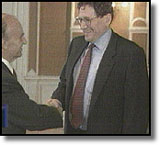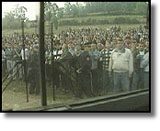
|
Holbrooke Begins Balkan Peace MissionRichard Holbrooke, the architect of the 1995 Dayton peace agreement which ended nearly four years of war in Bosnia, has arrived in the Croatian port town of Split on a new Balkan peace mission.On arrival Mr Holbrooke said there had been some progress but that the pace was too slow. He said he would "try to accelerate the process and keep it moving forward." Mr Holbrooke went straight into a meeting with the Bosnian President, Alija Izetbegovic, and the Croatian President, Franjo Tudjman. The American Envoy will also travel to Sarajevo and Belgrade, where he'll meet with Slobodan Milosevic, the President of the Federal Republic of Yugoslavia.
It's understood that Mr Holbrooke will press Mr Milosevic - who was President of Serbia throughout the war and maintained close relations with the Bosnian Serbs - to order the arrest of the former Bosnian Serb leader Radovan Karadzic, indicted for war crimes by the International Tribunal in The Hague. Prior to meeting with Mr Holbrooke, President's Izetbegovic and Tudjman discussed the ongoing crisis over the peace agreement. President Tudjman has faced strong international criticism for not pressuring his Bosnian Croat allies to abide by the agreement. Bosnian Croat leaders have refused to hand over suspected war criminals to the Tribunal and have prevented Muslim refugees from returning to their homes in areas under Croat control.
In effect, Bosnian Croats regard themselves as Croatian citizens: they vote in Croatian elections, use Croatian currency and drive cars with Croatian number plates. Over the weekend, hundreds of Muslims who recently returned to their homes in the central Bosnian town of Jajce - from where they were "ethnically cleansed" during the bloody Croat-Muslim conflict of 1993-94 - were forced to flee after threats and harassment from Croat mobs. The two Presidents committed themselves to strengthening Bosnia's political independence and to increasing cooperation between Bosnia and Croatia.
President Izetbegovic made no public reference to the events in Jajce. In a statement after the meeting, he said: "I think we had overestimated the possibility of implementing something like the return of refugees, freedom of movement and punishment of war criminals...but recently there have been some positive trends...there is a wave of returns in central Bosnia which shows some trends for the future". President Tudjman said: "It is not just the question of Jajce, it is a very complex question and should be solved with goodwill and organisation so that there are no new conflicts."
Related sites
|
Diana, Princess of Wales, 1961-1997
Conference 97
Devolution
The Archive
News |
Issues |
Background |
Parties |
Analysis |
TV/Radio/Web
Interactive |
Forum |
Live |
About This Site
News |
Issues |
Background |
Parties |
Analysis |
TV/Radio/Web
Interactive |
Forum |
Live |
About This Site
© BBC 1997 |
politics97@bbc.co.uk |



